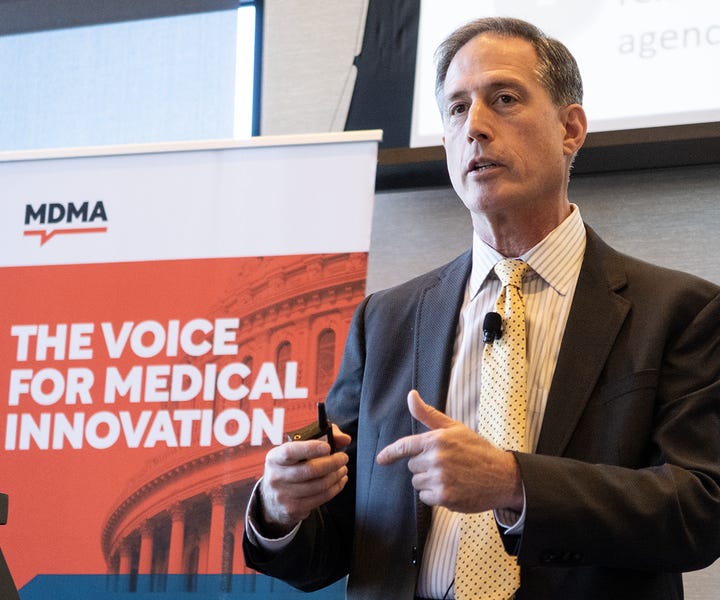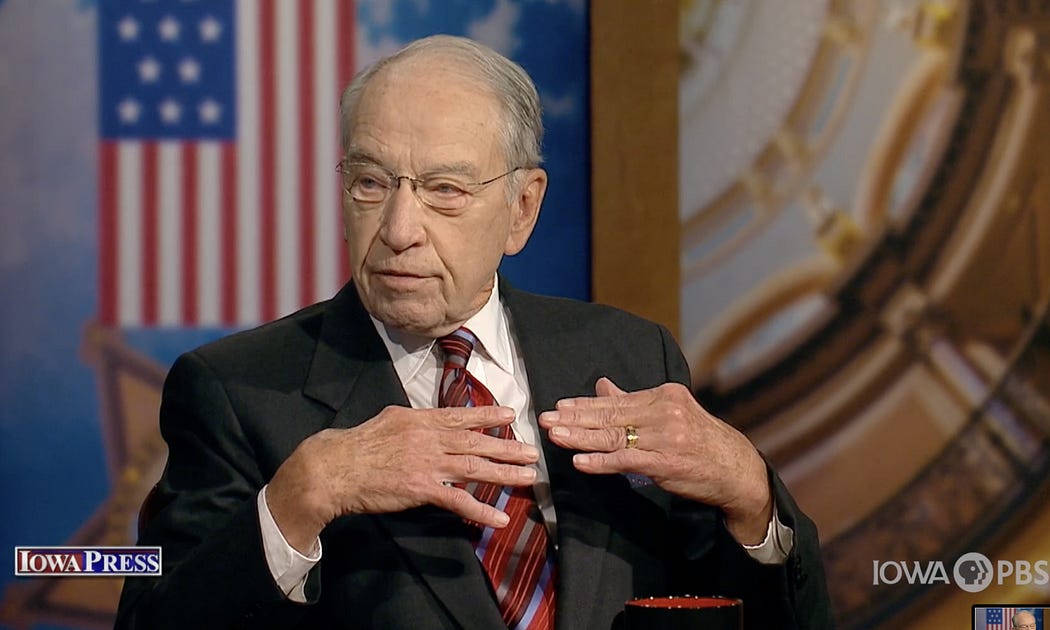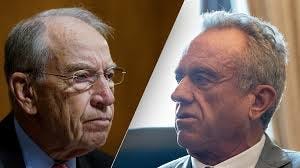Rooting Out Healthcare “Fraud-on/at-FDA” Needs a Precision Scalpel, Not a Chainsaw: The False Claims Act
Submitted to Popular Rationalism by Hooman Noorchasm, MD, PhD
President Trump’s most precise tool for recovering US taxpayer dollars lost to fraud in the healthcare arena is President Abraham Lincoln’s Civil War-era law, known as “The Lincoln Law”—today, the False Claims Act. Instead of an indiscriminate chainsaw, Mr. Trump would be well served to unleash the full force of the False Claims Act in the healthcare space.
The Trump administration aims to limit fraud, misuse, and abuse of taxpayer dollars by the federal administrative state. The administration been determined that a major source of loss in the federal government is an inefficient and bloated federal bureaucracy. This idea is almost certainly correct in some quarters of the US federal bureaucracy. But a “one-size-fits-all” approach to the indiscriminate dismissal of thousands of federal employees is likely inefficient and potentially damaging to fixing the problem.
The primary source of the problem of waste and abuse caused by the federal administrative state is not intrinsic to the design or original purpose of the federal bureaucracy. Instead, the root cause is that an unacceptably large fraction of our federal government’s administrative state is now captured by industry actors — from elected officials serving in Congress to appointed bureaucrats in charge of executive branch agencies. The legal and political source of this government captured by industry is another topic — but simply put, when the large corporate sector, not the people, rules dominantly over US government agencies and personnel, citizens get shortchanged, robbed, or harmed. I believe that President Trump’s rise to unprecedented populist influence is directly related to the increasing disenfranchisement of American democracy from the machinations of the U.S. government and its industry partners and experts. When industry captures the US flag for profit alone, without regard for people’s safety and well-being, democracy rises in populist outrage — and rightly so.
This ongoing corporate capture of the U.S. administrative state has created a biased, pro-industry, and, in many cases, anti-citizen administrative state prone to waste and perpetuation of fraud for profit’s sake—robbing the U.S. Treasury of taxpayer dollars and exposing unsuspecting American citizens to harm.
No place is this type of federally enabled fraud more rampant than in the healthcare sector today - wherein not only are taxpayers’ Medicare/Medicaid dollars susceptible to abuse but American patients’ very safety and lives are at stake.

The executive agency with direct control over the U.S. healthcare marketplace is the United States Food and Drug Administration (FDA). This agency is a sprawling administrative state staffed by appointed or career federal employees who control the entry of almost all medical products into the US healthcare marketplace. However, corruption, or negligence, in certain policies and high-level offices at the FDA, away from that agency’s prime mission of protecting the American public, has put consumer safety and the time-tested principles of evidence-based medicine in the rear seat. Instead, under the guise of “lifesaving innovation” and “expert guidance”, the FDA has shifted focus towards efficient collaboration with revenue-seeking industry and professional stakeholders for decades. Missing from the conversation are the harmed and dead patients sacrificed at the altar of the American healthcare industry.
The fuel for this travesty against US public health originates in fraud— committed by a non-negligible proportion of profit-seeking American healthcare corporations on the US Treasury through the massive taxpayer funds allocated to the Centers for Medicare and Medicaid Services (CMS). However, the outrage is that in many cases, this fraud is enabled or tolerated by the very appointed guardians of the federal administrative state at HHS and FDA.
In general, the anatomy of fraud has three core mechanistic components:
1) Corporate profit-seekers intentionally misrepresent and market ineffective, unsafe or over-priced products to consumers,
2) Federal and state laws that inadequately restrain the marketing of ineffective, unsafe, or over-priced products and
3) Negligent or Deliberate failure on the part of Federal regulators to enforce laws enacted to prevent the marketing of ineffective, unsafe, or overpriced products.
All three of these components have harmonized in the US healthcare sector for decades, and this harmonization of fraudulent healthcare market activity poses a real and present national health and economic security threat to the United States in 2025.
How can the Trump administration begin to unentangle this complex web of corruption in the healthcare sector? What is the solution to this deep administrative state corruption at HHS and FDA?
Certainly, a large number of public servants do good work within the U.S. Department of Health and Human Services. So, throwing the baby out with the bathwater is the wrong approach to solving the problem. The corruption has been occurring from the top at our federal agencies — not necessarily in the lower rungs of the agency’s administrative structure, where many patriotic and law-abiding Americans have intended to do our republic’s work faithfully. So, it is difficult to see how an indiscriminate chainsaw purge at all levels of the FDA bureaucracy could solve the problem of fraud. It may be a mistake to get a massive chunk of this federal bureaucracy without care or consideration for the parts and people who work well and patriotically to accomplish our republic’s sacred mission: To protect and serve!
The truth is that fixing corruption at our federal healthcare agencies is like resecting a complex cancer from a patient’s body. It requires a nuanced understanding of the process and a few precise legal tools — and it requires a reliance on proper and muscular federal law enforcement at DOJ and HHS — not an indiscriminate chainsaw. Sadly, in recent decades, FDA bureaucrats have been more interested in playing ball with profit-hungry industry actors disguised as healthcare saviors than in proper law enforcement and fighting fraud on/at the FDA, on American patients, and on the U.S. Treasury.

However, the Department of Justice (DOJ) has highly effective legal tools to fight crime and fraud on (and at) the FDA. The problem is that the secretary of Health and Human Services and the FDA commissioner need to be willing to properly deploy federal law enforcement to fight fraud at and on their agencies— and to root out negligent appointed personnel who fail to apply and enforce the mandates of the Food, Drug, and Cosmetics Act (FDCA) with fidelity and integrity. So far, the secretaries of HHS and FDA commissioners have been unwilling to do so — instead taking a lenient or protectionist approach and maintaining their industry favoritism in confronting fraudulent market actors in the healthcare sector. No place is this rampant level of fraud more visible than in the FDA’s medical device section, named the Center for Devices and Radiological Health (CDRH), especially when it comes to devices regulated using the agency’s 510(k) clearance mechanism.

On the DOJ side, the False Claims Act is an exact and powerful legal fraud-busting tool. President Abraham Lincoln originally enacted this law to litigate and limit fraud and abuse of taxpayer dollars during the Civil War. The law was subsequently resurrected by Senator Chuck Grassley (R-IA). And it remains the US government’s primary legal tool for fighting fraud in the U.S. Treasury. However, utilizing it in a muscular way to bust fraud on the US Treasury in the healthcare space requires that the Secretary of Health and Human Services and the FDA commissioner transparently open the door to prosecution of fraud by the DOJ. In the past, when the FDA acted in a protectionist way to protect its internal corruption, the DOJ was muzzled or unable to use the False Claims Act to its maximum potential.

However, the RFK Jr. HHS promises to be a different kind of HHS—one where protectionism to cover up internal agency errors or negligence and improper execution of the FDCA won’t be tolerated. Attorney General Pam Bondi seems squarely focused on robust law enforcement to prosecute and prevent fraud on U.S. taxpayers.

During the confirmation hearings of Attorney General Pam Bondi and Secretary of Health and Human Services Robert F. Kennedy Jr., Senator Grassley directly inquired and confirmed both candidates’ commitment to law enforcement under the False Claims Act. These queries by the Iowa Senator were highly encouraging because they highlighted that the Secretary and Health and Human Services would fully and transparently cooperate with the Department of Justice to root out corporate fraud and corruption using the False Claims Act — in the healthcare sector and elsewhere.

Instead of a one-size-fit-all approach to cutting a mostly patriotic and competent federal workforce at the FDA, Mr. Trump would be well-advised to leash the full force of the False Claims Act on well-dressed corporate fraudsters robbing the U.S. Treasury and harming unsuspecting American patients. Let’s hope RFK Jr. and AG Bondi are given full latitude to do so. “fraud-on/at-FDA” should be a prime target — especially in the medical device arena, where Lord of the Flies has reigned supreme for over a decade.
First published on Medium by Dr. Noorchasm.
These are the views of this warrior doctor who fights for medicine to be far less harmful to patients by accepting liability and improving the service for all mankind. Dr. Noorchasm lost his wife to morcellation, a brutal procedure that spread her cancer. He advocates for the safety of medical devices and all medicines.





"it is difficult to see how an indiscriminate chainsaw purge at all levels of the FDA bureaucracy could solve the problem of fraud."
Doctor Noorchasm writes with erudition and makes many accurate and concise observations in this article.
That said, every organization that succumbs to systemic fraud, suffers from the same problem; the restructuring of incentives that form organizational culture. The "scalpel" paradigm proposed, is sensible, but elides one insurmountable confounding factor; the temporal issue.
This is by way of asserting that in the context of large organizations, reform is timebound. In private or commercial operations, that binding is based on capital flows and retention. With public organizations in democratic societies, the constraint is founded in electoral shifts.
The good doctor makes compelling arguments, but I would respectfully assert that the fraud has been allowed to become too deeply embedded, systemically, for the scalpel to do more than temporarily suppress the fraud. Doctor Noorchasm is spot-on regarding the risk level. I would say that there are not one, but two crimes here; the systemic corruption and the necessity to take such a large risk.
EXCELLENT article! Thank you. Will spread it.